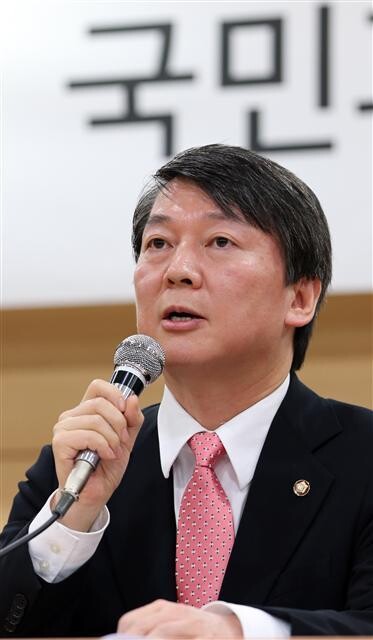hankyoreh
Links to other country sites 다른 나라 사이트 링크
The history of municipal elections in South Korea

By Kim Jong-cheol, political correspondent
Independent lawmaker Ahn Cheol-soo, who had pledged to start a new political party in Mar. 2013, promised that the Jun. 4 local election would be “every man for himself, with no alliances,” increasing chances that the election will pit a unified ruling party against a fractured opposition. Ahn’s comments are renewing interest in the results of the 2010 local elections, which the ruling party faced a united opposition, and the 2006 local elections, when each party fielded separate candidates.
During the 2006 municipal elections, the ruling party was the Uri Party (predecessor to today’s Democratic Party), and the opposition party was the Grand National Party (now the Saenuri Party [NFP]). At the time, the Uri Party failed to unite the groups that were traditional supporters of the opposition. There were various reasons for this, including a government probe into payments made by the Roh Moo-hyun administration to North Korea and allegations that the government was neglecting the Honam region, referring to southwest Korea, an opposition stronghold.
With Roh’s approval rating plummeting, the election became something of a judgment of the administration itself. With liberal lawmakers such as Han Hwa-gap and Chu Mi-ae refusing to join the Uri Party and remaining with the other opposition party, or the Democratic Party (a predecessor to today’s incarnation), a three-way battle ensued between the Uri Party, the Grand National Party, and the Democratic Party.
During the 2006 elections, the Grand National Party won 12 of 16 crucial provincial and mayoral elections across the country, including Seoul, Gyeonggi Province, and Incheon in the greater capital area. In contrast, the Uri Party barely managed to win one, the governorship of North Jeolla Province, while the Democratic Party won two seats in Gwangju and South Jeolla Province.
The Grand National Party also won a landslide victory in smaller municipal elections for mayors, county and district chiefs. All 25 of Seoul’s districts, 27 out of 31 districts in Gyeonggi Province, and 9 out of 10 in Incheon went to the Grand National Party. In contrast, the Uri Party only prevailed in one race in Gyeonggi Province out of all 66 total races in the capital area.
Outside of the Honam region, not a single Democratic Party candidate came close to being elected. The Grand National Party also had an overwhelmingly strong showing in metropolitan council elections in all parts of the country outside of Honam (which is traditionally liberal), sweeping 102 out of 106 seats in Seoul.
Four years later, the balance between ruling and opposition parties had shifted, resulting in a completely different state of affairs in the 2010 local elections. This time, the Democratic Party, Unified Progressive Party, and progressive-leaning independent candidates formed an alliance. The ruling party (which was by then the Grand National Party) only managed to win six out of 16 critical seats nationwide, including the Seoul mayoralty and the governor’s seat for Gyeonggi province. The Democratic Party, on the other hand, came up on top in seven important elections overall, including Incheon, North and South Jeolla Provinces and Gwangju, North and South Chungcheong Provinces, and Gangwon Province.
The Grand National Party was only able to claim victory in 15 out 66 races for district chiefs in the capital region, including four of the 25 districts in Seoul. Meanwhile, the Democratic Party carried the day in 46 races in the capital region, winning in 21 districts in Seoul. This was also the first time that the Democratic Labor Party elected two district chiefs in Incheon.
The unified opposition also won a majority in metropolitan councils in the capital region, with the Democratic Party taking 79 seats on the Seoul Metropolitan Council, contrasting with 27 seats for the Grand National Party.
Please direct questions or comments to [english@hani.co.kr]

Editorial・opinion
![[Column] Park Geun-hye déjà vu in Yoon Suk-yeol [Column] Park Geun-hye déjà vu in Yoon Suk-yeol](https://flexible.img.hani.co.kr/flexible/normal/500/300/imgdb/original/2024/0424/651713945113788.jpg) [Column] Park Geun-hye déjà vu in Yoon Suk-yeol
[Column] Park Geun-hye déjà vu in Yoon Suk-yeol![[Editorial] New weight of N. Korea’s nuclear threats makes dialogue all the more urgent [Editorial] New weight of N. Korea’s nuclear threats makes dialogue all the more urgent](https://flexible.img.hani.co.kr/flexible/normal/500/300/imgdb/original/2024/0424/7317139454662664.jpg) [Editorial] New weight of N. Korea’s nuclear threats makes dialogue all the more urgent
[Editorial] New weight of N. Korea’s nuclear threats makes dialogue all the more urgent- [Guest essay] The real reason Korea’s new right wants to dub Rhee a founding father
- [Column] ‘Choson’: Is it time we start referring to N. Korea in its own terms?
- [Editorial] Japan’s rewriting of history with Korea has gone too far
- [Column] The president’s questionable capacity for dialogue
- [Column] Are chaebol firms just pizza pies for families to divvy up as they please?
- [Column] Has Korea, too, crossed the Rubicon on China?
- [Correspondent’s column] In Japan’s alliance with US, echoes of its past alliances with UK
- [Editorial] Does Yoon think the Korean public is wrong?
Most viewed articles
- 1[Column] Park Geun-hye déjà vu in Yoon Suk-yeol
- 2Thursday to mark start of resignations by senior doctors amid standoff with government
- 3[Editorial] New weight of N. Korea’s nuclear threats makes dialogue all the more urgent
- 4Will NewJeans end up collateral damage in internal feud at K-pop juggernaut Hybe?
- 5Why Korea shouldn’t welcome Japan’s newly beefed up defense cooperation with US
- 6[Guest essay] The real reason Korea’s new right wants to dub Rhee a founding father
- 7Kim Jong-un expressed ‘satisfaction’ with nuclear counterstrike drill directed at South
- 8[Column] ‘Choson’: Is it time we start referring to N. Korea in its own terms?
- 9N. Korean hackers breached 10 defense contractors in South for months, police say
- 10[Column] Yoon’s first 100 days should open our eyes to pitfalls of presidential system